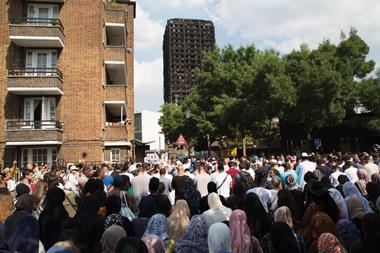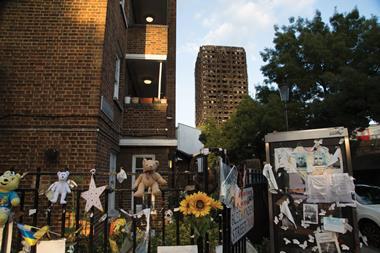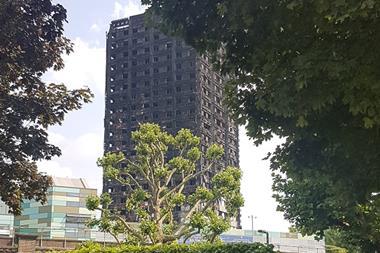The final report of the government-commissioned Hackitt review into the Grenfell fire tragedy has urged a “radical rethink” of the safety system, but does not push for a ban on flammable cladding.

Delivered almost a year after Grenfell Tower fire, in which 71 people lost their lives, Dame Judith Hackitt’s independent report states that a “culture change” is needed in building to stop a “race to the bottom”.
She said some building firms used ambiguity around the rules to “game the system”, and called for a regulator.
Earlier this week, Prime Minister Theresa May outlined plans to cover £400m of costs for councils and housing associations to replace potentially dangerous cladding from high-rise blocks in the wake of the Grenfell disaster.
However, Hackitt, a senior engineer who used to chair the Health and Safety Executive, did not call for a ban on materials capable of burning from tall buildings, saying that prohibiting certain practices would “not address the root causes” of the problems.
In announcing the findings, Hackitt did go on to say that said she was ”open” to seeing combustible cladding banned in future.
Instead her key conclusions in the 156-page report centred on the following issues within the building sector:
- Roles and responsibilities for building safety are unclear
- Regulations and guidance are “ambiguous and inconsistent” and are “misunderstood and misinterpreted”
- There is ignorance about the rules governing the industry
- The process that drives compliance with the regulations are “weak and complex”
- Competence (of people in the system) is “patchy”
- The process for testing and certifying products is “disjointed, confusing, unhelpful and lacking any sort of transparency”
David Lammy, Labour MP for Tottenham, called the report “a betrayal and a whitewash”. “It is unthinkable and unacceptable that so many people can die in a disaster like Grenfell and one year on flammable cladding has not been banned,” he added.
Labour’s London Assembly spokesperson for housing Tom Copley added: “Almost one year on from the tragic events at Grenfell, it was extremely disappointing to see the Hackitt Review fall completely short of any reasonable expectations. It is outrageous that there has not been a resolute call to ban dangerous flammable cladding from any future developments.”
Property reacts
Alongside political reaction, there was mixed response on the reviews findings from across differing aspects of the property sector.
Lord Porter, chairman of the Local Government Association, said it was “good that Dame Judith’s report agrees that the current system is not fit for purpose and has set out a range of recommendations for its long-term reform”.
“However, our immediate priority is to ensure that a fire like that at Grenfell never happens again, and to make certain the buildings which people live, visit and work in are safe today. It is therefore disappointing that Dame Judith has stopped short of recommending a ban on combustible materials and the use of desktop studies, both essential measures to improve safety.
From a legal perspective, Barry Hembling, partner at Fladgate, added: “The recommendations from Dame Judith Hackitt’s final report confirm there is to be a shift away from the government holding the burden for updating and maintaining industry guidance. In practice this means responsibility for issues surrounding the inadequacy of the building regulations and fire safety being transferred to the industry to resolve. The sector is to be asked to specify solutions that satisfy the government’s functional standard.”
From a property management perspective, Mark Varley, head of health and safety at FirstPort, said: “As property managers we welcome that the report has tackled duties, compliance and enforcement in relation to the design, construction and management of buildings. The changes will help us take more of a ‘whole-building’ approach to safety once the baton of responsibility is handed over to us by developers and freeholders. An expert approach to safety with rigorous governance requires a fundamental shift in our industry and the Hackitt Review should be just the beginning of this. Landlords need absolute confidence that they are dealing with a competent and responsible property manager, while residents need us to speak with confidence about how we manage and mitigate any risks to their homes.”
































No comments yet